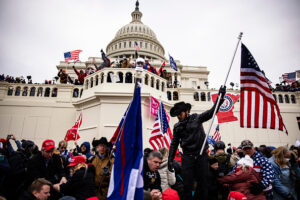
Do *you* see obstruction here? (Photo by Samuel Corum/Getty Images)
On Friday, the men appointed to the Supreme Court by Republicans gave a green light to right-wing coups. Maybe that sounds like a bit of an overstatement, but not by much. In a victory for the folks who tried to violently hand the results of the 2020 election to Donald Trump despite the actual vote, the Court held that the crime of obstructing an official proceeding doesn’t apply to rioters. That ruling will apply to 300+ other January 6th defendants — including the former president.
(Yes, Ketanji Brown Jackson wrote a concurrence in the case that makes sense as a former defense attorney but also, fundamentally ignores that the majority is a bunch of faithless actors and if the goal of the January 6th riots had been to install Barack Obama into a third term, they would have written the exact opposite decision. So, let’s act like it’s Bruno and not talk about it.)

Chrometa: Turning Time Into Billable Value For Modern Lawyers
Adoption of Chrometa represents more than a technological upgrade; it reflects a professional philosophy that values accuracy, transparency, and efficiency.
Anyway, Amy Coney Barrett writes the dissent, and it’s a salty delight to read. Now, before progressives start penning ACB fanfic (again), let’s not forget she also signed onto parts of the majority opinion in the immunity case, functionally giving presidents the ability to use Seal Team 6 to assassinate political opponents with immunity. Wheeeee.
But in the Fischer case, Barrett gets it dead on. Her dissent reads like she’s personally affronted as a textualist that this case even made it to the Supreme Court.
The Court does not dispute that Congress’s joint session qualifies as an “official proceeding”; that rioters delayed the proceeding; or even that Fischer’s alleged conduct (which includes trespassing and a physical confrontation with law enforcement) was part of a successful effort to forcibly halt the certification of the election results. Given these premises, the case that Fischer can be tried for “obstructing, influencing, or impeding an official proceeding” seems open and shut. So why does the Court hold otherwise?
Because it simply cannot believe that Congress meant what it said. Section 1512(c)(2) is a very broad provision, and admittedly, events like January 6th were not its target. (Who could blame Congress for that failure of imagination?) But statutes often go further than the problem that inspired them, and under the rules of statutory interpretation, we stick to the text anyway. The Court, abandoning that approach, does textual backflips to find some way— any way—to narrow the reach of subsection (c)(2). I respectfully dissent.
But she’s not done calling out the majority. Barrett takes real umbrage at the loosey goosey way the majority misapplies statutory interpretation to get to the political result they favor, “This interpretation might sound faithful to the statute, because the limit comes from a related provision rather than thin air. But snipping words from one subsection and grafting them onto another violates our normal interpretive principles.” She concludes, “The Court’s reasons for departing from these rules are thin.”

Pursuing The Pro Bono Story: A Conversation With Alicia Aiken
This Pro Bono Week, get inspired to give back with PLI’s Pursuing Justice: The Pro Bono Files, a one-of-a-kind podcast hosted by Alicia Aiken.
And when the majority tries a statutory canon sleight of hand, there is Barrett telling us how dumb it is.
These canons are valuable tools. But applying either to (c)(2) is like using a hammer to pound in a screw it looks like it might work, but using it botches the job.
What it comes down to for Barrett is the text. I mean, it *is* right the fuck there, and pretty obvious as Barrett notes in her intro. She just (rightly) cannot let it go.
As the Court sees it, interpreting (c)(2) according to its plain text would render other obstruction provisions, within §1512 and throughout Chapter 73, superfluous. Ante, at 10–12.
The Court exaggerates.
When Congress writes a broad law, Barrett thinks the result should be a broad law:
There is no getting around it: Section 1512(c)(2) is an expansive statute. Yet Congress, not this Court, weighs the “pros and cons of whether a statute should sweep broadly or narrowly.” United States v. Rodgers, 466 U. S. 475, 484 (1984). Once Congress has set the outer bounds of liability, the Executive Branch has the discretion to select particular cases to prosecute within those boundaries. By atextually narrowing §1512(c)(2), the Court has failed to respect the prerogatives of the political branches.
Even if that puts conservatives in jail.
 Kathryn Rubino is a Senior Editor at Above the Law, host of The Jabot podcast, and co-host of Thinking Like A Lawyer. AtL tipsters are the best, so please connect with her. Feel free to email her with any tips, questions, or comments and follow her on Twitter @Kathryn1 or Mastodon @[email protected].
Kathryn Rubino is a Senior Editor at Above the Law, host of The Jabot podcast, and co-host of Thinking Like A Lawyer. AtL tipsters are the best, so please connect with her. Feel free to email her with any tips, questions, or comments and follow her on Twitter @Kathryn1 or Mastodon @[email protected].